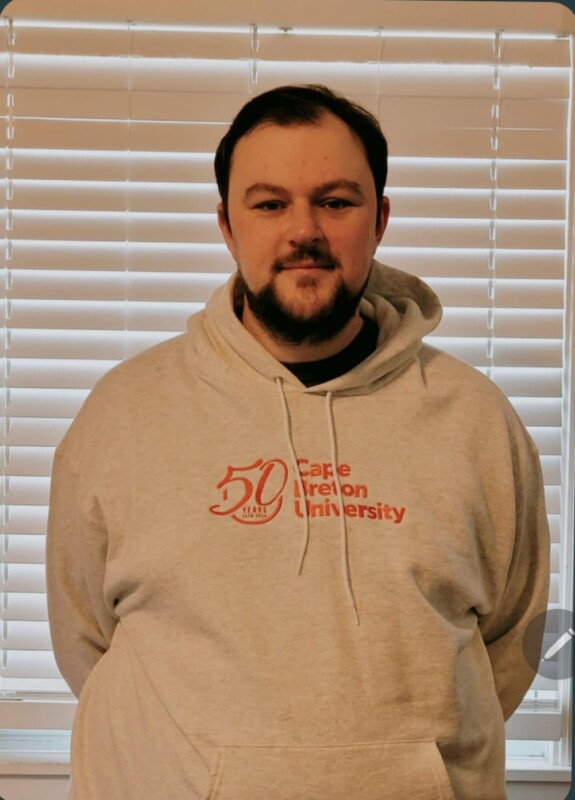Navigating Research in Algorithmic Healthcare Management: Meet Matthew MacLeod
 Inspired by his thesis work during his final year at Cape Breton University, Matthew MacLeod’s passion for research has only grown since graduating. Now as a research assistant for Dr. Virginia Gunn, a leading researcher exploring algorithmic management in healthcare, Matthew has found himself at the intersection of cutting-edge technology and human well-being.
Inspired by his thesis work during his final year at Cape Breton University, Matthew MacLeod’s passion for research has only grown since graduating. Now as a research assistant for Dr. Virginia Gunn, a leading researcher exploring algorithmic management in healthcare, Matthew has found himself at the intersection of cutting-edge technology and human well-being.
Growing up in Whitney Pier, Matthew chose CBU because it allowed him to study close to home while enjoying all the university has to offer. “The close-knit nature of CBU makes it possible to build professional relationships with our instructors, which would be extremely difficult to do at larger universities,” he shares. Matthew sees several professors as mentors, noting their passion for encouraging critical thinking and their support in offering career advice.
In 2023, Matthew graduated with a Bachelor of Arts (Honours) in Psychology and certificates in Psychology Research Methods and Mental Health Support. In the final year of his undergraduate studies, with a strong focus on research, Matthew ultimately decided to pursue a career as a researcher. After reading about Dr. Gunn’s research on artificial intelligence (AI) in healthcare, he knew he wanted to get involved. “It’s been incredible to delve into the complex applications of AI and other digital technologies in healthcare and understand their future implications,” shares Matthew.
Dr. Virginia Gunn, Assistant Professor in the School of Nursing, is one of five faculty members awarded $10,000 as part of CBU’s 50th Anniversary Scholar Awards. Her research, Mapping the use of algorithmic management in healthcare and its possible implications for the health workforce: A scoping review, is conducted with a team of health researchers and practitioners with expertise in health system and health workforce issues. The project also involves collaboration with multidisciplinary national and international researchers, as well as CBU students as research assistants.
As part of the research team, Matthew has been involved in a variety of tasks, including conducting literature review searches, retrieving and organizing publications, reading and screening publications for relevance, extracting data and writing summaries. “I have learned skills such as working collaboratively with individuals with different research and academic backgrounds, using literature review platforms such as Covidence, organizing large amounts of data and tackling large projects systematically,” he adds.
The experience has been a steep learning curve, but Matthew has embraced it with enthusiasm. “While I don’t have a background in healthcare, the skills I’ve gained through my health-related projects with Dr. Gunn have helped me work on projects in other fields,” he shares. Matthew plans to pursue a master’s in Forensic Psychology, a research-intensive program, and believes his experience will set him apart. “My work with Dr. Gunn has given me diverse research experiences and skills that will help to demonstrate my capabilities to graduate schools,” he adds.
Matthew sees AI in healthcare as a transformative field, one that can drive change in how care is delivered. “Research in the realm of AI in healthcare is incredibly important to better address challenges and opportunities of the future and to study its effects on health workers and patient care,” he explains. “I feel fortunate to be working with someone who has such a wealth of knowledge and experience, and I am excited to think about how our research could impact change.”
With the variety of research projects across different fields at CBU, Matthew encourages students to take advantage of research opportunities, regardless of their academic background. It is also beneficial to take research classes to build critical skills such as organization, writing and analytical thinking. “My best advice would be to ask to be involved,” he says. “Even if the research isn’t directly related to your program, it’s a great way to show your versatility and explore new interests. Experience builds and once the ball gets rolling, it becomes easier to snowball into additional projects.”
Beyond academics, Matthew is an advocate for getting involved in co-curricular activities and volunteering to gain experience and expand connections. “If your program has a related student society, try joining the executive for leadership experience,” he suggests. “You never know when you might make a valuable contact through your volunteering efforts.”
From building lasting relationships with professors and peers to contributing to meaningful research, Matthew’s story highlights the opportunities and connections that make CBU a special place to learn and grow. His work alongside Dr. Gunn is just one example of the synergy between our faculty, staff and students, which allows us to combine traditions and new ideas in ways we are always excited to experience. Their contributions remind us that our story is one we have written over the past five decades and continue to write together.